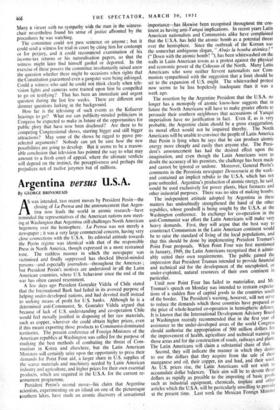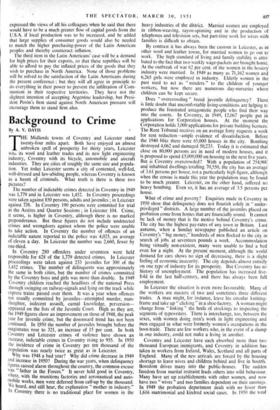Argentina versus U.S.A.
ay GEORGE BRINSMEAD S was intended, two recent moves by President PerOn—the closing of La Prensa and the announcement that Argen- tina now leads the world in atomic research—have reminded the representatives of the American nations now meet- ing at Washington that Argentina still challenges North American hegemony over the hemisphere. La Prensa was not merely a newspaper ; it was a very large commercial concern, having very close connections with the U.S.A. Its editorial attitude towards the Pertin regime was identical with that of the responsible Press in North America. though expressed in a more restrained tone. The ruthless manner in which the newspaper was victimised and finally suppressed has shocked liberal-minded persons—and especially journalists—throughout the Americas ; but President Peron's motives are understood in all the Latin American countries, where U.S. behaviour since the end of the war has often caused resentment.
A few days ago President Gonzalez Videla of Chile stated that the International Bank had failed in its avowed purpose of helping under-developed nations, and had devoted itself instead to seeking means of profit for U.S. banks. Although he is a determined anti-Communist, Sr. Gonzalez Videla argued that because of lack of U.S. understanding and co-operation Chile would feel morally justified in disposing of her raw materials, such as copper, wherever she could obtain higher prices, even if this meant exporting those products to Communist-dominated territories. The present conference of Foreign Ministers of the American republics at Washington was called for the purpose of studying the best methods of combating the threat of Com- munism in Korea and elsewhere, but the Latin American Ministers will certainly seize upon the opportunity to press their demands for Point Four aid, a larger share in U.S. supplies of the scarce materials and machinery needed by Latin American industry and agriculture, and higher prices for their own essential products, which are required in the U.S.A. for the current re- armament programme.
President PerOn's second move—his claim that Argentine scientists, experimenting on an island on one of the picturesque southern lakes, have made an atomic discovery of sensational importance—has likewise been recognised throughout the con- tinent as having anti-Yanqui implications. In recent years Latin American nationalists and Communists alike have complained that the U.S.A. has held the atomic bomb as a potential threat over the hemisphere. Since the outbreak of the Korean war the somewhat ambiguous slogan, " Abajo la bontba atontica I" (" Down with the atomic bomb! "), has been whitewashed on the walls in Latin American towns as a protest against the physical and economic power of the Colossus of the North. Many Latin Americans who were neither fervent nationalists nor Com- munists sympathised with the suggestion that a limit should be set to the expansion of U.S. might. The whitewashed protest now seems to be less hopelessly inadequate than it was a week ago.
The assertion by the Argentine President that the U.S.A. no longer has a monopoly of atomic know-how suggests that in future the North Americans will have to make greater efforts to persuade their southern neighbours that accusations of Yanqui imperialism have no justification in fact. Even if, as is very probable, the Argentine claim should be a gross exaggeration, its moral effect would not be impaired thereby. The North Americans will be unable to convince the people of Latin America that Peron is lying when he says that he can produce atomic energy more cheaply and easily than anyone else. The Presi- dent's announcement has had the desired effect upon the .imagination, and even though the Latin Americans were to doubt the accuracy of his premises, the challenge has been made and cannot be ignored or undone. Moreover, General Peron's comments in the Peronista newspaper Dentocracia at the week- end contained an implicit rebuke to the U.S.A. which has not gone unheeded. Argentina's production of atomic energy, he said. would be used exclusively for power plants, blast furnaces and other industrial purposes. There was no idea of making bombs.
The independent attitude adopted by Argentina in these matters has undoubtedly strengthened the hand of the other republics, whose goodwill is being sought by the U.S.A. at the Washington conference. In exchange for co-operation in the anti-Communist war effort the Latin Americans will make very heavy demands. First, they will argue that the best way to counteract Communism in the Latin American continent would be to raise the standard of living of the local populations, and that this should be done by implementing President Truman's Point Four proposals. When Point Four was first mentioned in January, 1949, the Latin Americans recognised that it admir- ably suited their own requirements. The public gained the impression that President Truman intended to provide financial and technical aid for the development of the un.exploited, or under-exploited, natural resources of their own continent in particular. Until now Point Four has failed to materialise, and Mr. Truman's speech on Monday was intended to restrain expecta- tions of a sudden flow of capital goods to the countries south of the border. The President's warning, however, will not serve to reduce the demands which those countries have prepared as the price of whole-hearted co-operation in hemispheric defence. It is known that the International Development Advisory Board at Washington recently recommended that in the first year of assistance to the under-developed areas of the world Congress should authorise the appropriation of 500 million dollars for the improvement of health, agriculture and technical training in those areas and for the construction of roads, railways and plant. The Latin Americans will claim a substantial share of that.
Second, they will indicate the manner in which they desire to use the dollars that they acquire from the sale of their manganese and oil, their copper, tin and lead, and their wool. As U.S. prices rise, the Latin Americans will not wish to accumulate dollar balances." Their aim will be to devote those dollars as rapidly as possible to the importing of basic goods such as industrial equipment. chemicals, tinplate and other articles which the U.S.A. will be particularly unwilling to.pro' ide at the present time. Last week the Mexican Foreign Minister expressed the views of all his colleagues When he said that there would have to be a much greater flow of capital goods from the U.S.A. if local production was to be increased, and he added that large supplies of consumer goods would also be needed to match the higher purchasing-power of the Latin American peoples and thereby counteract inflation. The third item in the Latin Americans' case will be a demand for high prices for their exports, so that these republics will be able to afford to pay the inflated prices of the goods that they wish to purchase in North America. None of those problems will be solved to the satisfaction of the Latin Americans during the present conference ; but they will all agree in principle to do everything in their power to prevent the infiltration of Com- munism in their respective territories. They have not the slightest intention of accepting Argentine leadership, but Presi- dent Peron's firm stand against North American pressure will encourage them to stand firm also.































 Previous page
Previous page